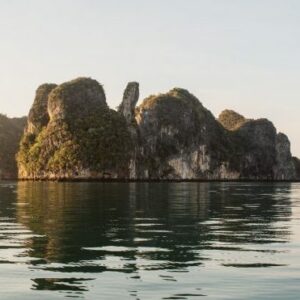Editor’s Note: It’s easy to feel overwhelmed or apathetic when faced with the sheer volume of need in our world. Writing a check or volunteering with a local organization are important steps to walking in justice, but they’re not the only steps. “Alternate Routes” is a blog series that explores imaginative ways of cultivating empathy and restoring the cracked pieces of the world—in other words, alternate routes to living justly. Read the first post here. Up next: mountaineering.
“Mountains… remind us of our vulnerability, our ultimate lack of control over the world we live in. [They] demand humility and yield so much peace in return.”
– Alex Lowe
On a rainy night in October of 2014, I was rear-ended by a thoroughly intoxicated driver while I sat at a red light in a Seattle suburb. Bombing down the hill behind me at 40 mph, the driver didn’t even tap the breaks of his Toyota Corolla before slamming into my Civic and sending its trunk right up into the back seat. I went flying across the intersection, spinning 180 degrees to face the culprit, who stumbled out of his totaled metal heap and took off running. I shoved open my door—the only door that wasn’t permanently crunched shut at this point—and stood up for a moment before collapsing on the concrete. At least, that’s what the police report says. I still don’t remember any of it.
I vaguely remember waking up at the medical center downtown. They’d sewn up a pretty nasty laceration in the back of my head and had me on a fairly strong sedative. I remember my parents being there, and asking them if it was my fault, and apologizing before they could say, “No, no, it wasn’t your fault.” I couldn’t imagine receiving a phone call at one in the morning from the premiere head trauma center of the West Coast: “Your daughter was in an accident.” After seeing the remains of my Civic at the impound lot, the shattered glass and blood-splotched headrest, I couldn’t quite wrap my mind around the fact that this had happened to me. I wasn’t asking for it. I didn’t get in the car drunk and high. Unfortunately, my story isn’t unique. We see this same injustice unfolding all around us every day—innocent bystanders hurt by the actions, intentional or not, of the people around them.
That winter, I started climbing mountains. I enrolled in a basic mountaineering course, bought my first ice axe, and set my sights on the snowy peaks of the Olympics and the Cascades. I signed up because my car accident made me feel so completely fragile, and I wanted to prove that I wasn’t. I also wanted something to focus on so I wasn’t writing poems about the fragility of life and eating take-out pizza with red wine for dinner every night. But as the plans we make for ourselves tend to do, my method of distraction and empowerment became something much different than I anticipated. Mountaineering became for me an alternate route to achieving, if only to some degree, justice.
When you’re climbing mountains, walking over a glacier, and setting up alpine rock pitches, every decision you make puts life in sharp relief. The further you go, the more drastic the consequences of your decisions become. Soon, every decision you make, whether it’s the route you travel, the food you eat, the partners you choose, or even the heaviness with which you step over ice, directly and immediately matters. That meant I had to be intentional, recognizing that every action I made had impact on my life and those around me. Sure, that meant one bad decision and something could go terribly wrong. But that also meant that I had the power to choose the right thing. I wasn’t in over my head climbing mountains. I learned own strength and I began to understand what I was capable of, and what I couldn’t do (yet).
The more I learned this lesson, the more comfortably I was able to respond to criticism. “Climbing mountains is so dangerous, so foolish. You’re just asking to die young,” someone might protest, to which I would respond, “You’re more likely to die in your car than on a mountain.”
It doesn’t all come down to statistics. In mountaineering, there’s endless emphasis placed on awareness. Driving in our cars, texting and changing radio stations and getting to all of places we need to get to faster and faster, we’re hardly aware of what’s really going on. We don’t grasp the fact that, when we’re stopped at a red light, we might moments later be struck and spun across the intersection in a violent, drunken collision. We don’t even register the possibility as a real danger.
With awareness of danger also comes awareness of grace—the grace by which we live, and the grace that eliminates discrimination, promotes equality, and demands just living. In the mountains, humans are left to their own raw devices, and ultimately, all humans share the same potential devices: passion, love, logic, and strength the same. In a car or on the street or with my family, the same as on a mountain, I had unlocked a brand new awareness. I couldn’t control the actions of others. I couldn’t have prevented that man from drinking, getting in his car drunk, or slamming his car into mine. But I was suddenly aware of what made me the same as him: the impact I had on the people around me, and the control I had over my own decisions. Just as I could hurt someone by making a poor and thoughtless decision, I also had the utter freedom to be intentional and choose what was right. I could live justly.
By Sarah Reeves


